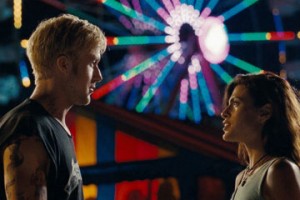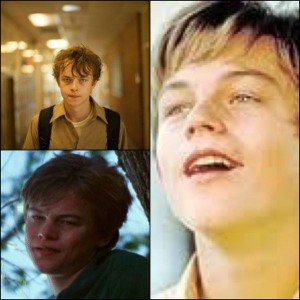
The Place Beyond the Pines opens with long, lingering, loving tracking shots of a heavily tattooed Ryan Gosling as Luke, as he heads into battle for the evening, his “Arena” a small carnival, and his gladiator duties carried out in the ring of the “Globe of Death,” a big steel ball that motorcycle riders zip around in in circles for the desultory thrill of the small carnival crowds. The composition of the framing and tracking echoes Mickey Rourke as The Wrestler — there’s a poignancy there, a sadness to the warrior striding into the ring without much of a war to fight.
This is the second collaboration for Ryan Gosling and director Derek Cianfrance, and this opening is as loud as their first effort, Blue Valentine, was quiet.
Eva Mendes quickly surfaces as a fling (“Eva Mendes’s nipples” might be up for a supporting actress Oscar, so ardently do they strain and arch through her threadbare tanktops, they are a character unto themselves.) But Luke’s a roadie, no one can settle him down.
In movie shorthand: we now know, tattoos equals a desperate bad-boy menace, overlaid onto the soul of a poet. His t-shirts worn inside-out throughout the movie tell us he’s a rebel. As spectator sports go, this Xtreme steel contraption seems fully as dumb as it is poignant — the metaphor of grown men riding motorcycles in a circle inside a big ball that goes nowhere is more than a little obvious. The interconnectedness of Man — and all the narrow hits and misses of fate — will also be replayed throughout as a theme. And Eva Mendes’s nipples are doomed to yearn for a future they can never quite have.
Except, when (cool) Luke returns to town a year later and inadvertently discovers they have an infant son. Somewhat inexplicably for a drifter, he immediately decides to put down roots and try to do the right thing. He resigns from the carnival.
He’s going to need a job, so he conveniently falls in with Ben Mendelsohn’s Robin (in what would be the Tim Blake Nelson role if this were a Coen Brothers movie). They spend about 48 seconds on the notion of Luke helping Robin out as a mechanic, and then Robin proposes the only logical job for a babydaddy looking to support a new family: robbing banks. He enthusiastically makes his case, “I’ve done it four times myself.” (Looking around his squalid surroundings, and the trailer he loans to Luke as a temporary domicile, it seems bank robbing must not be as lucrative as it’s dreamed up to be.) Luke is initially resistant. “Good luck supporting your family on minimum wage,” Robin taunts. Well, ok, now that you put it like that and all other options have been exhausted… EVERYBODY DOWN! THIS IS A ROBBERY.
“Not since Hall and Oates has there been such a team,” they joke, as they count their loot while Bruce Springsteen’s “Dancing in the Dark,” plays jauntily in the background.
Luke’s goals for fatherhood are simple. He wants to feed baby Jason his first ice cream… maybe buy him a crib, and a few toys. He doesn’t have an especially vicious or sophisticated criminal mind; he just wants to provide for his family. But as Robin warns him (in what is, surely intentionally, the cheesiest line of dialogue from any indie this year), “if you ride like lightning, you’re gonna crash like thunder.”
This being a cops and robbers tale, it’s only a matter of time until Luke crosses paths with law enforcement. Enter Bradley Cooper, an entitled supreme court justice’s son and law school grad who’s slumming it on the thin blue line. He gets a heroic break or two and quickly parlays his ambition up the political food chain from cop to prosecutor. He has a baby too. He and Luke are really just two dads trying to do the best they can for their kids (except, not really). Fellow cop Ray Liotta makes an appearance during Act II of the film — turning the movie briefly into what looked like might become Training Day Lite — but he disappears almost as quickly as he arrives.

And just as abruptly as Act II of the movie ends, Act III begins and we are expected to invest in a third generation of two boys we know (and care) nothing about. The device for getting us there? A title actually crops up and says “Fifteen Years Later.”
The two boys (the sons of the Cop and the Robber) implausibly bond. “Reminds me of The Goonies,” one says, but their connection is clearly predator/prey. We’re left to ponder Nature vs. Nurture. Are the two boys a product of their genes or the environments in which they’ve been raised?
One son is an entitled brat, the other just can’t seem to get a break. Dane DeHaan’s performance — brief as it is — is touching (following up on the great work he did in HBO’s In Treatment). His uncanny resemblance to a young Leonardo DiCaprio (Gilbert Grape era) is enough to make viewers wonder what DiCaprio would have been like in the Gosling role.
The word that was consistently applied by critics in early screenings was “ambitious,” but “frustrating” would also be accurate. Blue Valentine wasn’t as successful as it could have been, but it was small in scope, small in canvas — a working class marriage deteriorates. Crime and Punishment spanning three generations isn’t a movie, it’s an epic, or maybe a mini-series, and Cianfrance isn’t quite that far along in his development as a director. He gets a B for effort, but a C for not knowing what he doesn’t know.
These criss-crossing narratives never come close to Altman. They’re not even as good as those of Crash (which robbed Brokeback Mountain of its rightful Oscar). Gosling isn’t a very successful robber, and Cooper is a worse cop. Eva Mendes’s nipples acquit themselves admirably, but of course they can’t be expected to carry a movie that runs well over two hours. Bon Iver plays moodily over the closing titles as the movie ends the way it began: on a motorcycle. A movie this big and this long just needs to offer a little more than a good start.





